Blog
The Ancient Superfood That Fed Civilizations: How Sri Lanka’s Sacred Jackfruit Could Transform Your Diet
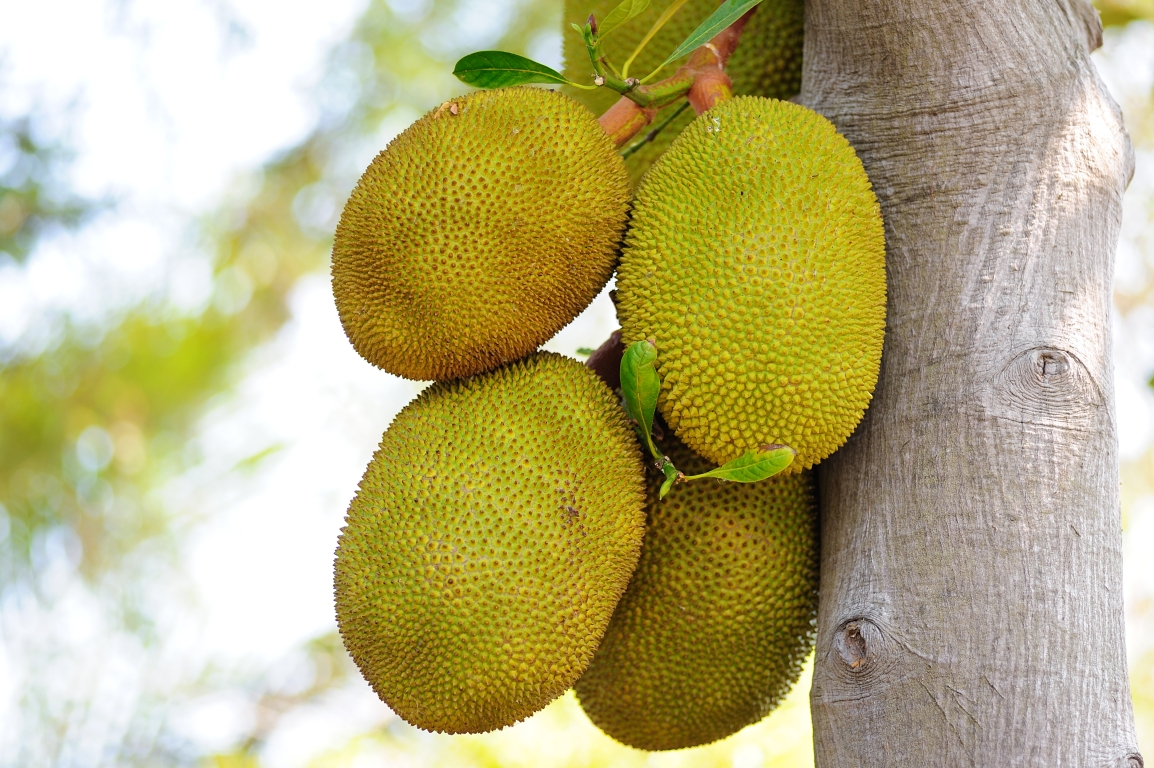
The Tree That Built a Nation
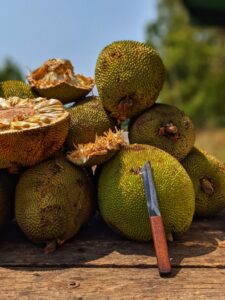
Picture this: In the misty highlands of ancient Sri Lanka, families would gather beneath towering trees whose branches bent low under the weight of massive, spiky fruits—some weighing up to 100 pounds. These weren’t just any trees; they were the cornerstone of civilization itself. For millennia, the jackfruit tree has stood as a silent sentinel in Sri Lankan villages, temple grounds, and royal gardens, providing sustenance that could feed a family for weeks from a single harvest.
What if there was a single fruit that could serve as a staple alternative to wheat, provide unique nutritional benefits, and sustain entire civilizations through droughts, wars, and famines? The answer lies in this tropical giant that has remained largely hidden from Western diets—until now. While Americans have been searching for the next superfood, Sri Lankans have been quietly cultivating one of nature’s most holistic nutritional powerhouses for millennia.
The jackfruit (Artocarpus heterophyllus) isn’t just another exotic fruit. It’s a testament to ancient wisdom about sustainable nutrition, and modern science is finally catching up to what Sri Lankan ancestors discovered thousands of years ago.
Ancient Roots, Timeless Nutrition
The Foundation of Sri Lankan Civilization
Archaeological evidence suggests that jackfruit cultivation in Sri Lanka dates back for millennia, making it one of the oldest documented food sources on the island. Ancient Sinhalese texts, including the Mahavamsa chronicle, reference the sacred jackfruit trees that grew in monastery gardens and royal compounds. These weren’t mere ornamental plants—they were carefully cultivated food security systems.
In ancient Sri Lankan society, jackfruit trees were considered so valuable that they were often included in land deeds and inheritance documents. A single mature tree could produce 100-200 fruits annually, providing enough carbohydrates to sustain a family of six for several months. This wasn’t just supplementary nutrition; jackfruit served as the primary carbohydrate source during certain seasons, effectively replacing what we now know as staple grains.
The Survival Superfood
Historical records from the Portuguese and Dutch colonial periods document how Sri Lankan communities survived extended droughts and crop failures thanks to their jackfruit reserves. Unlike wheat or rice, which required annual planting and favorable weather conditions, jackfruit trees produced consistently for decades, sometimes centuries, with minimal human intervention.
Traditional Sri Lankan families developed sophisticated preservation techniques that modern food scientists now recognize as nutritionally superior to many contemporary processing methods. They would slice unripe jackfruit into strips, dry them in the sun, and store them in clay pots—creating what was known as Atukos, a nutritious, preserved food that could last for months.
Sacred Symbolism and Cultural Integration
In Sri Lankan Buddhist tradition, jackfruit trees were often planted in temple courtyards as symbols of abundance and compassion. The tree’s ability to provide food without requiring the destruction of the plant (unlike annual crops) aligned with Buddhist principles of non-violence and sustainability. Many of these temple trees, some over 500 years old, still produce fruit today.
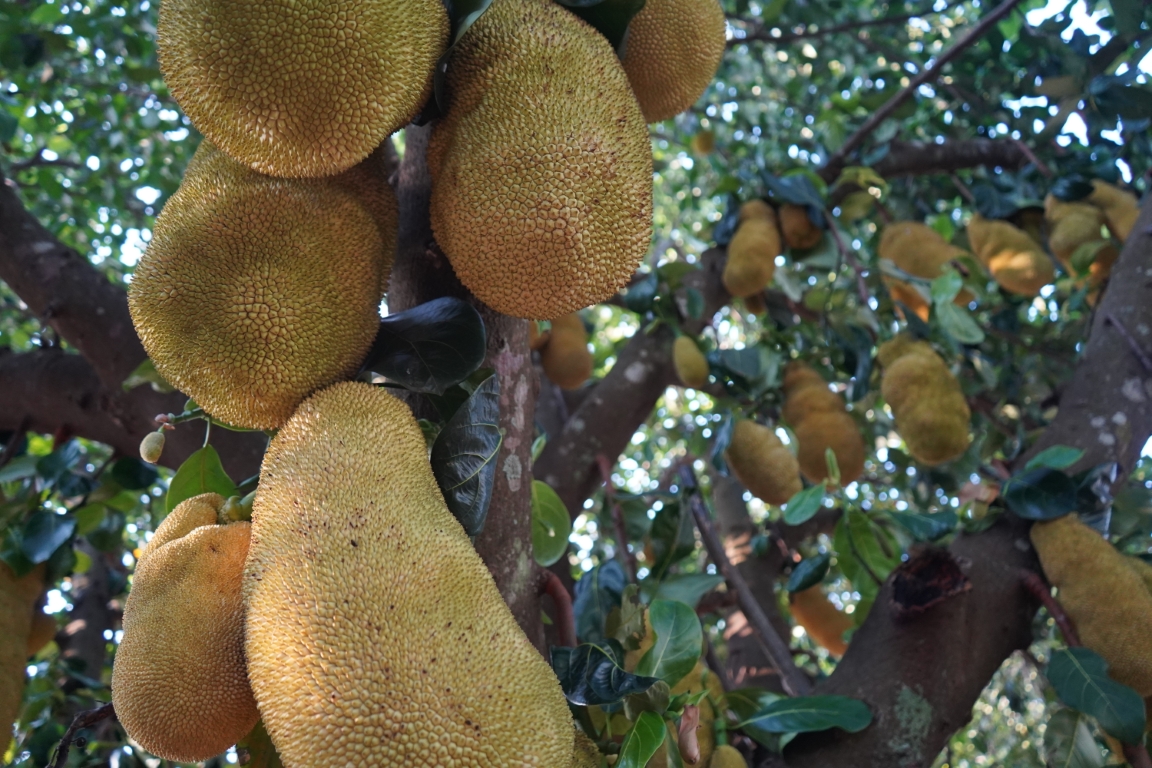
The Nutritional Revolution: A Profile for the Modern Diet
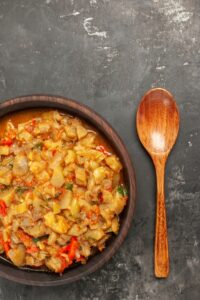
Protein Building Blocks
While processed wheat products are common staples, jackfruit offers a unique nutritional profile that stands out. Uniquely for a fruit, jackfruit contains all nine essential amino acids required by the human body. While it’s not a protein powerhouse like legumes, this quality makes it a valuable and versatile component of a plant-based diet.
Superior Digestive Health Benefits
A cup of jackfruit delivers around 2.5g of fiber. This fiber acts as a prebiotic, feeding the beneficial bacteria in your gut—a benefit absent in refined wheat flour. Unlike the sometimes harsh fiber found in processed wheat products, jackfruit contains both soluble and insoluble fiber in an optimal ratio that promotes digestive health without causing the bloating or discomfort that many Americans experience with refined grain products.
Blood Sugar Management
For the millions of Americans managing blood sugar, unripe jackfruit is an excellent choice. It has a low glycemic index, meaning it provides sustained energy without the sharp blood sugar spikes associated with refined grains like white bread (GI of ~75-85). This prevents the blood sugar crashes commonly associated with processed wheat-based foods, making jackfruit an excellent option for diabetics and those following low-glycemic diets.
Micronutrient Powerhouse
Jackfruit is naturally packed with Vitamin C (23% of Daily Value), Vitamin B6 (21% DV), and significant amounts of potassium and magnesium. These are nutrients that are often stripped from processed wheat during milling and must be artificially added back in. The antioxidant content in jackfruit includes powerful compounds like carotenoids and flavonoids that provide anti-inflammatory benefits—naturally occurring and bioavailable, unlike the synthetic vitamins often added to processed wheat products.
The Modern Discovery: When Science Meets Ancient Wisdom
Western Nutrition Science Catches Up
Only in the past decade have Western nutritionists begun to seriously study jackfruit’s nutritional profile. Research published in the Journal of Nutritional Science has confirmed what Sri Lankan grandmothers knew intuitively: jackfruit provides superior nutrition compared to many processed conventional staples.
Recent nutritional studies have validated the traditional understanding of jackfruit’s benefits, demonstrating how ancient wisdom about sustainable nutrition aligns with modern scientific findings.
Environmental Sustainability Champion
While wheat production requires vast amounts of water, synthetic fertilizers, and annual replanting, jackfruit trees thrive with minimal inputs. A single jackfruit tree can produce food for 50-100 years, requires no replanting, and provides multiple environmental benefits. As drought-tolerant trees, jackfruit cultivation requires significantly less irrigation water compared to resource-intensive grain crops like wheat. Additionally, jackfruit trees prevent soil erosion, create canopy for other plants, and contribute to biodiversity.
For environmentally conscious American consumers, jackfruit represents a sustainable alternative to resource-intensive grain production. The carbon footprint of jackfruit cultivation is nearly zero, as mature trees actually sequester more carbon than they produce.
Plant-Based Nutrition Communities Take Notice
The growing plant-based movement in America has embraced jackfruit not just as a meat substitute, but as a complete nutritional solution. Unlike highly processed plant-based alternatives, jackfruit provides nutrition in its natural form, aligning with the “whole foods” philosophy that drives many Americans’ dietary choices.
From Ancient Wisdom to Modern Application
Traditional Preparation Methods Meet Modern Nutrition
Ancient Sri Lankan preparation techniques are remarkably aligned with modern nutritional science. Traditional methods of ripening, drying, and fermenting jackfruit actually enhance its nutritional value—increasing bioavailability of nutrients and developing beneficial compounds that don’t exist in the fresh fruit.
The traditional practice of consuming jackfruit with coconut and jaggery (palm sugar) creates what nutritionists now recognize as an optimal macronutrient ratio for sustained energy and nutrient absorption. These combinations weren’t accidental—they were the result of thousands of years of nutritional wisdom passed down through generations.
Evolution to Convenient Forms
While ancient Sri Lankans had time to process whole jackfruits, modern lifestyles demand convenience. This need has driven innovation in jackfruit processing, leading to products like jackfruit strips, chips, and flour that retain the fruit’s nutritional benefits while fitting into contemporary dietary patterns.
The development of jackfruit-based convenience foods represents a bridge between ancient nutritional wisdom and modern lifestyle demands. These products offer the complete nutrition of traditional jackfruit consumption in formats that busy Americans can easily incorporate into their diets.
Meeting Modern Dietary Needs
Today’s dietary challenges—from gluten sensitivity to diabetes management—align perfectly with jackfruit’s natural properties. The fruit is naturally gluten-free, low-glycemic, and provides sustained energy without the crashes associated with processed foods. For the growing number of Americans seeking alternatives to conventional grains, jackfruit offers a time-tested solution.
The Future of Functional Foods
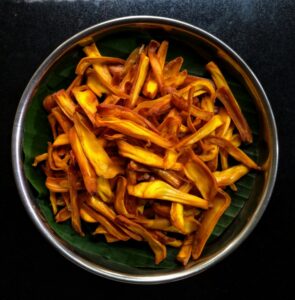
The Next Superfood Revolution
As Americans become increasingly sophisticated about nutrition, the demand for foods that provide multiple health benefits continues to grow. Jackfruit represents the next evolution in functional foods—not a synthetic creation, but a return to foods that have sustained human health for millennia.
The jackfruit industry is poised for significant growth as more Americans discover this ancient superfood. From jackfruit flour for baking to ready-to-eat jackfruit snacks, innovation in this space is creating new opportunities for health-conscious consumers to incorporate this nutritional powerhouse into their daily diets.
Bridging Cultures Through Food
The growing popularity of jackfruit in America represents more than just a dietary trend—it’s a cultural bridge connecting ancient Sri Lankan wisdom with modern American health consciousness. This connection demonstrates how traditional foods can address contemporary nutritional challenges while promoting global understanding and appreciation for diverse food cultures.
Your Journey into Ancient Nutritional Wisdom
The story of jackfruit in Sri Lanka is more than just agricultural history—it’s a testament to the power of sustainable, foundational nutrition. As you consider your own dietary choices, remember that sometimes the most innovative solutions are actually the oldest ones, refined by thousands of years of human experience.
In our next article, we’ll explore how to incorporate jackfruit into your daily diet, examining specific preparation methods and recipes that maximize its nutritional benefits. We’ll also delve deeper into the science behind jackfruit’s unique nutritional profile and how it can address specific health concerns common among Americans today.
The ancient superfood that sustained civilizations is ready to transform your diet. The question isn’t whether jackfruit will become a staple in American kitchens—it’s how quickly you’ll discover the benefits that Sri Lankan families have known for thousands of years.
Ready to experience the nutritional wisdom of ancient Sri Lanka? Stay tuned for our next article in this series, where we’ll show you exactly how to incorporate this remarkable superfood into your modern lifestyle.









